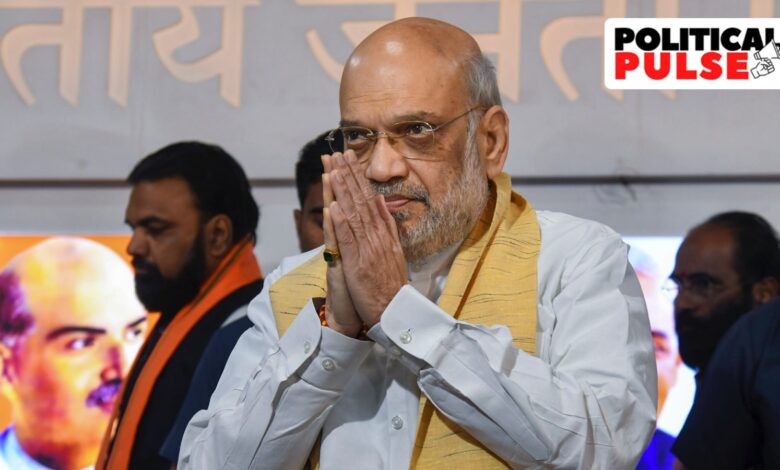Amit Shah’s ‘end of separatism’ claims, and what it means for the Hurriyat | Political Pulse News

Over two successive days last week, Union Home Minister Amit Shah brought up statements by four little-known political outfits of Jammu and Kashmir to underline “the death of separatism” in the Union Territory.
Apart from their near-identical language, what was common to the statements was that the outfits professing them are little-known, one-man bodies, and all declared that they were ending their association with the Hurriyat Conference.
The statements came close on the heels of the Centre banning two of the biggest Hurriyat members, and amidst a renewed crackdown by the Jammu and Kashmir Police on separatist outfits.
Even without Shah’s remark, the government’s sustained campaign against and the shrinking of what was once the Valley’s biggest separatist conglomerate has been evident.
In his first post on the issue, on X on March 25, Shah said: “Separatism has become history in Kashmir. The unifying policies of the Modi government have tossed separatism out of J&K. Two organizations associated with the Hurriyat have announced the severing of all ties with separatism… It is a big victory for PM Shri @narendramodi Ji’s vision.”

The two outfits were identified as the Democratic Political Movement and Jammu and Kashmir People’s Movement.
The day after, Shah posted: “Another great news from Kashmir Valley. Two more groups affiliated with the Hurriyat, namely J&K Tahreeqi Isteqlal and J&K Tahreek-I-Istiqamat, have discarded separatism and reposed their trust in the new Bharat built by PM Shri @narendramodi Ji. Under the Modi government, separatism is breathing its last.”
Story continues below this ad
The Tehreek-e-Istiqlaal and Tehreek-e-Istiqamat are not part of either of these two main Hurriyat factions – the hardline one led by Masarat Alam since the demise of Syed Ali Shah Geelani, and the moderate wing led by Mirwaiz Umar Farooq.
A senior separatist leader told The Indian Express: “I myself have heard the names (of the two outfits named by Shah) for the first time.”
These announcements by the Centre coincided with raids by the J&K Police – whose control falls under the Lieutenant Governor in the Union Territory’s power arrangement – on residences of separatist leaders across the Valley and launching of investigations in old cases. Many of these separatist leaders facing police action are in jail, of whom several have been behind bars since the abrogation of Article 370 in August 2019.
In the nearly six years since then, in the face of the action by the authorities, the Hurriyat has been rendered virtually defunct. The amalgam has not even issued a political statement in this time.
Story continues below this ad
While almost the entire top- and middle-rung leadership of the Masarat faction is in jail, the moderate faction – which has always advocated dialogue for resolution of the Kashmir issue – saw two of its biggest outfits recently banned by the Centre. They included Mirwaiz’s own political outfit Awami Action Committee (AAC) and the Ittehad-ul-Muslimeen led by Shia leader Masroor Abbas Ansari.
Mirwaiz’s movements remain tightly controlled by authorities, even after his four-year house detention ended in 2023. This Friday was the latest instance of the Valley’s chief cleric not being allowed to deliver his sermon at Srinagar’s Jamia Masjid.
Many of the other prominent constituents of the Mirwaiz-led faction are no longer active, leaving him as its sole voice. Bilal Lone of the People’s Conference and Professor Abdul Gani Bhat of the J-K Muslim Conference – who were executive members of the Hurriyat — distanced themselves from politics long back and, unlike others, were not arrested or put under house detention.
Of the four “separatist leaders” belonging to the four outfits who issued statements severing ties with separatism – – Ghulam Nabi Sofi, Ghulam Nabi War, Shahid Saleem and Advocate Mohammad Shafi Reshi – only Reshi is a somewhat prominent face in political circles.
Story continues below this ad
After Shah hailed their decision, Reshi, who headed the Democratic Political Movement, a constituent of the Hurriyat led by Geelani, and who is is the uncle of PDP leader Yasir Reshi, said he had left separatist politics back in 2017 – two years before the scrapping of J&K’s special status.
Hurriyat sources also point to the distinct similarities as far as the wording of the statements by the four go, which all went along the lines of: “… that I have neither inclination towards not any sympathy for the ideology of APHC (All Party Hurriyat Conference), that I have no connection with aforementioned groups, that I am a bonafide citizen of India and have no association with any organisation or party whose agenda, directly or indirectly, goes against the interest of India.”
However, even if the outfits and their standing on the ground remains in doubt, the Centre’s political message of an uncompromising stand is loud and clear.
It also further dims expectations that the government wants to keep a channel of engagement open with the separatists. These hopes had been spurred by the February visit by Mirwaiz to Delhi lasting more than a week, where he held talks and met leaders seemingly without any curbs.
Story continues below this ad
But then came the ban on the Awami Action Committee and Ittihadul Muslimeen, who have been active in Kashmir politics for over six decades. The ban on the Awami Action Committee specifically was seen as reinforcement of the message by the Centre that it wanted Mirwaiz to restrict himself to only religious issues.
Incidentally, in the past, the Centre itself has held talks with the Mirwaiz-led Hurriyat faction, both under the NDA and UPA governments.
Mainstream political parties of Kashmir see the developments as proof that the Centre wants “silence” in the Valley. “The government wants to redefine the space for politics, and keep it available only for the mainstream… They want to erase other social, religious and separatist spaces,” PDP legislator Waheed Para said.
After the Assembly elections last year, there was hope that some space would be given to political dissent, Para added. “But the assault continued… It is just that some people have been elected and the cost was silence. The whole incentive of the elections was silence.”






